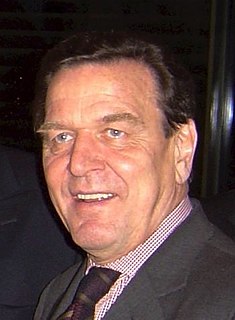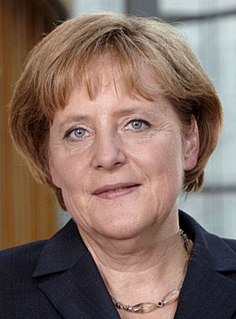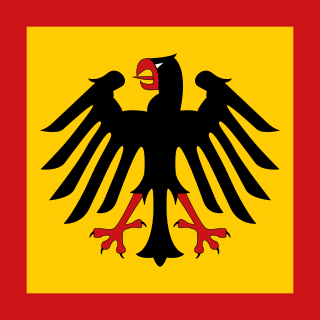
The Free Democratic Party is a liberal and classical liberal political party in Germany. The FDP is led by Christian Lindner.

Germany is a democratic, federal parliamentary republic, where federal legislative power is vested in the Bundestag and the Bundesrat.

The President of Germany (Bundespräsident) is the titular head of state of the Federal Republic of Germany. The president's tasks are mostly ceremonial, but for the signing of all new federal laws before they go into effect. In practice however, all presidents have had informal influence on politics and society but mostly in a non-partisan way.

Federal elections were held in Germany on 27 September 1998 to elect the members of the 14th Bundestag. The Social Democratic Party emerged as the largest faction in parliament, with its leader Gerhard Schröder becoming Chancellor.

Federal elections were held in West Germany on 25 January 1987 to elect the members of the 11th Bundestag. This was the last federal election held in West Germany prior to German reunification.

Federal elections were held in West Germany on 6 March 1983 to elect the members of the 10th Bundestag. The CDU/CSU alliance led by Helmut Kohl remained the largest faction in parliament, with Kohl remaining Chancellor.

The North Rhine-Westphalia state election, 2005, was conducted on 22 May 2005, to elect members to the Landtag of North Rhine-Westphalia in Germany. It was a victory for the Christian Democratic Union, who received enough seats to form a coalition with their preferred partner, the FDP, and end the previous government formed by the Social Democratic Party and the Greens, who also ruled at the federal level.

Federal elections were held in Germany on 18 September 2005 to elect the members of the 16th Bundestag. This became necessary after a motion of confidence in Chancellor Gerhard Schröder failed on 1 July. Following the defeat of Schröder's Social Democratic Party (SPD) in a state election, Schröder asked his supporters to abstain from the Bundestag motion, knowing the motion would fail and thus triggering an early federal election.

Federal elections took place on 27 September 2009 to elect the members of the 17th Bundestag (parliament) of Germany. Preliminary results showed that the Christian Democratic Union (CDU), its Bavarian sister party, the Christian Social Union (CSU), and the Free Democratic Party (FDP) won the election, and the three parties announced their intention to form a new centre-right government with Angela Merkel as Chancellor. Their main opponent, Frank-Walter Steinmeier's Social Democratic Party (SPD), conceded defeat. The Christian Democrats previously governed in coalition with the FDP in most of the 1949–1966 governments of Konrad Adenauer and Ludwig Erhard and the 1982–1998 governments of Helmut Kohl.

Federal elections were held on 22 September to elect the members of the 18th Bundestag of Germany. At stake were all 598 seats to the Bundestag, plus 33 overhang seats determined thereafter. The Christian Democratic Union/Christian Social Union (CDU/CSU) of Chancellor Angela Merkel won their best result since 1990, with nearly 42% of the vote and nearly 50% of the seats. However, their coalition partner, the Free Democrats (FDP), failed to meet the 5% vote threshold in what was their worst showing ever in a federal election, thus denying them seats in the Bundestag for the first time in their history.
In modern Germany with its parliamentary system of government on federal and on state level, grand coalition describes a governing coalition of the two biggest parties in one parliament. In most cases this means a coalition of the Union and the Social Democrats (SPD).

The history of Germany since 1990 spans the period following the Reunification of Germany, when West Germany and East Germany were reunited after being divided during the Cold War. Germany after 1990 is referred to by historians as the Berlin Republic. This time period is also determined by the ongoing process of the "inner reunification" of the formerly divided country.

An indirect presidential election was held in Germany on 30 June 2010 following the resignation of Horst Köhler as President of Germany on 31 May 2010. Christian Wulff, the candidate nominated by the three governing parties, the Christian Democratic Union, the Christian Social Union of Bavaria and the Free Democratic Party, was elected President in the third ballot. His main contender was the candidate of two opposition parties, the Social Democratic Party and the Alliance '90/The Greens, independent anti-communist human rights activist Joachim Gauck.

Federal elections were held in Germany on 24 September 2017 to elect the members of the 19th Bundestag. At stake were all 598 seats in the Bundestag, as well as 111 overhang and leveling seats determined thereafter.

A state election was held on 31 August 2014 in the state of Saxony in Germany, as required by the state constitution. Minister-President Stanislaw Tillich sought to retain power.

The third cabinet of Federal Chancellor Angela Merkel was sworn in on 17 December 2013. Led by Merkel, the government was supported by a coalition of the Christian Democratic Union (CDU), the Christian Social Union of Bavaria (CSU), and the Social Democrats (SPD).

The 2016 Rhineland-Palatinate state election was held on 13 March 2016 to elect all 101 members to the Landtag of Rhineland-Palatinate. Seats are allotted by proportional representation with a 5% threshold. State elections were held on the same day in Baden-Württemberg and Saxony-Anhalt.

The 2017 German presidential election was held on 12 February 2017 to elect the 12th President of Germany. Incumbent President Joachim Gauck announced on 6 June 2016 that he would not stand for re-election, citing his advancing age.





















